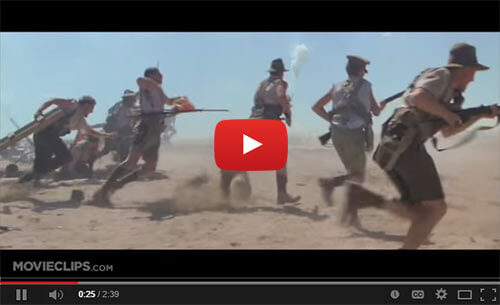What are we to make of the Battle of the Nek, depicted below in a video scene from the film Gallipoli (historically accurate according to everything I’ve read and a prominent military historian with whom I’ve consulted)?
The General asks soldiers to unload their rifles, get out of the trench and to attack with only bayonets. Of course, the soldiers are riddled by machine gun fire and slaughtered.
Click the image below to watch a clip from the movie
Gallipoli (1981)
depicting the Battle of the Nek.

The Battle of the Nek took place on August 7, 1915 on a narrow stretch of ridge on the Gallipoli peninsula (present-day Turkey). In this scene, Australian soldiers, armed only with bayonets, climb out of their trenches and charge the heavily-defended Ottoman line. The first wave of attackers is cut down and eliminated by machine-gun fire within seconds.
Two minutes later, the second wave of attackers suffers the same fate.
Transcript of the first 18 seconds: "We go ahead, as planned. Come on, lads. Unload your rifles. Nothing up the spout. We're going in with the bayonets. No bullets. Unload. Nothing up the spout. We're going in with the bayonets. (Laughs nervously) Steady, lads. Wait for it! (Whistle)" |
Upon viewing this video, it takes a great deal of psychic work to overcome our reaction (“I don’t believe it”), even when we know this happened.
Indeed, thousands of battles during the First World War employed a similar battle “strategy.”
Do we wish to continue to say that Generals who initiated such attacks were intent upon “winning?”
Or do battles like this exemplify Carolyn Marvin’s hypothesis that society “depends on the death of its own members at the hands of the group?”
The enemy, Marvin says, constitutes the pretext to “slaughter group members.” The nation sends its soldiers to die, but is not “their visible executioner.” Rather, we depend upon the enemy to execute “members of the sacrificial class” (soldiers).
Why do I continue to bring you this sad, unpleasant news? Because—once having embraced the truth—our understanding of history changes forever.
|